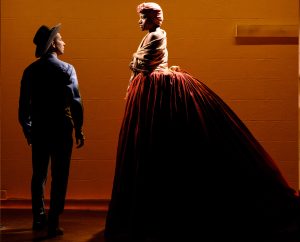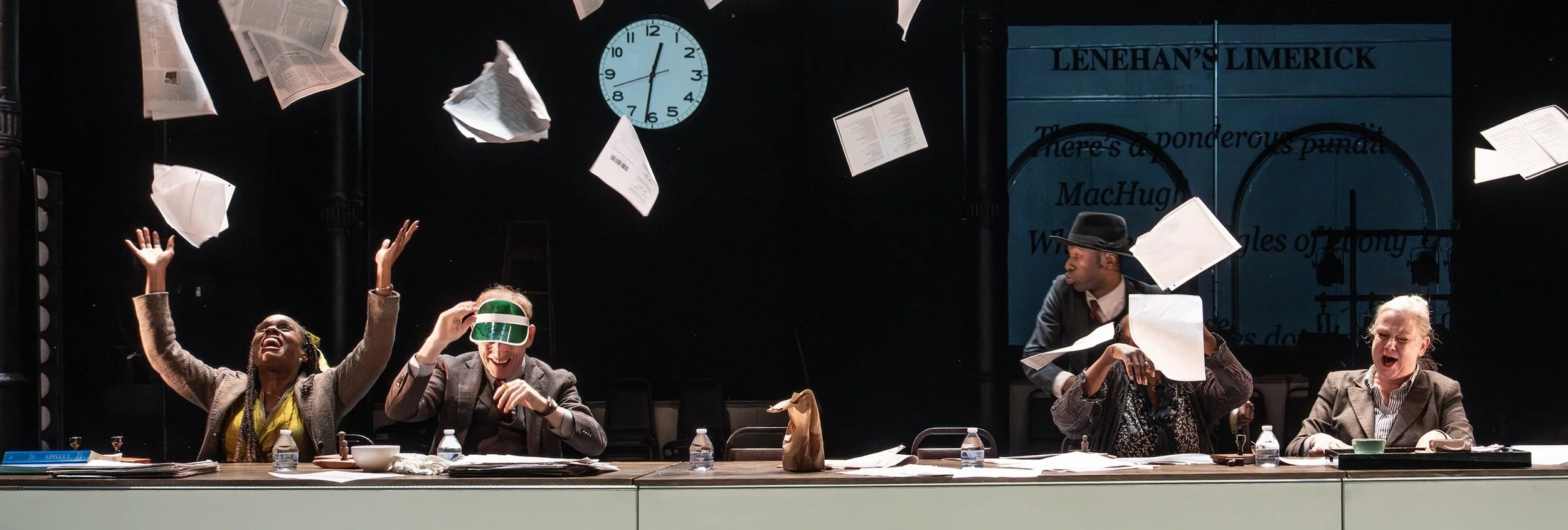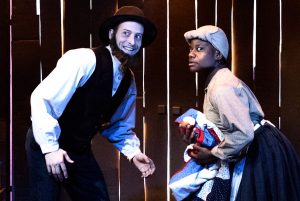In Heaux Church, writer-performer Brandon Kyle Goodman turns the traditional sermon on its head, transforming sex education into a joyful act of healing and self-acceptance. Directed by Lisa Owaki Bierman, and with DJ Ari Grooves and Greg Corbino backing a gospel of pleasure and pride, Goodman delivers a rousing, tongue-in-cheek service that’s part confession, part celebration.
Oratorio for Living Things
Oratorio for Living Things, Heather Christian’s new music-theater piece, was supposed to open on March 30, 2020. Two weeks before that, New York City’s playhouses closed precipitately in response to Covid-19. On the second anniversary of the aborted premiere, Oratorio has returned. After 24 months of isolation and loss, there’s a miraculous feel to this piece of theater.
Dr. Ride’s American Beach House
Dr. Ride’s American Beach House, a new play by Liza Birkenmeier, is an intriguing slice of life set on a St. Louis rooftop on Friday, June 23, 1983, the night before Sally Ride became the first American woman in space. If younger members of today’s LGBTQ community often take for granted the plight of their elders, Birkenmeier’s play bravely imagines what it was like when being gay involved claustrophobic secrets, blind struggle and a stepping into the void to create a reality without social or cultural precedence.
Mrs. Murray’s Menagerie
No one attends the symphony for a surprise ending, or to watch the string section go rogue. The enjoyment lies in the way that each instrument performs as expected, to the height of the players’ abilities, creating controlled harmonies and disciplined rhythms that pull at the heart while being pleasing to the ear. So it is with Mrs. Murray’s Menagerie, the absorbing new comedy from The Mad Ones that finds six parents, each with an instantly recognizable personality, playing off one another during a market-research session at a pace that can only be described as musical.
Rags Parkland Sings the Songs of the Future
As our country’s partisan roistering continues its crescendo, the adventurous Ars Nova is presenting a space-travel yarn, set 300 years from now, that speaks to the autocratic tendencies of the current regime in Washington, D.C. Rags Parkland Sings the Songs of the Future, subtitled A Science-Fiction Folk-Concert Musical, features 15 numbers in a variety of styles composed by Andrew R. Butler.
Tomorrow in the Battle
Curious title, Tomorrow in the Battle. It’s a phrase from Richard III (Act V, scene 3), the partial title of a well-reviewed 1994 novel by Spanish writer Javier Marías, and apparently the English translation of a German war cry. And what it has to do with what’s happening on Ars Nova’s stage, heaven knows. At any rate, to enjoy Kieron Barry’s drama, you’d better love London: there’s a lot of it here. And you’d better have a tolerance for shaky British accents. Patrick Hamilton, as our not-altogether-heroic hero, can’t decide whether to pronounce it “again” or “a gain”; he keeps going back and forth. And Ruth Sullivan and Allison Threadgold, as the women in his life, flatten or broaden their vowels as they see fit, not always consistently.
KPOP
Ars Nova’s KPOP begins with a chorus of glittering young Korean pop performers belting the lyrics “the future’s standing right in front of you.” Indeed, the purported mission of the play’s fictional management enterprise, JTM Entertainment, is to bring K-Pop to American audiences, and the production delivers K-Pop-styled numbers in droves.
Aboveground Racial Politics
Underground Railroad Game, a bold and imaginative theatrical piece created by Jennifer Kidwell and Scott Sheppard, is a bawdy satire in which the audience is made to look head-on at the serious issues of race, sexuality, and how we deal with them in the aftermath of slavery. Guided by a thoughtful director, Taibi Magar, the piece exposes the damage that has been done to the national psyche by slavery’s devastating legacy, especially in terms of interracial relationships and the ways we communicate.

Two teachers—Caroline (Kidwell), an African American woman, and Stuart (Sheppard), a white man, are teaching a fifth-grade class project on the Civil War. Dressed as a Quaker abolitionist, Stuart aids a distressed runaway (Kidwell) in a campy tête-à-tête that establishes the sexual energy between the two characters immediately. Then the action abruptly changes to the bright, fluorescent-filled modern classroom where the two are enthusiastically teaching the issues of the Civil War. The teachers quickly include the “class” (i.e. the audience) in the “games” of war, incorporating “safehouse signs” and “slave dolls.” Soon the battle of the sexes is added to the mix, as well as interracial relationships, as the teachers spend time together outside the classroom.
Kidwell as Caroline gives a raw, bold, yet vulnerable interpretation of the African-American woman and her torn relationship with white men. Sheppard’s comical yet painfully exposed performance as Stuart breaks through serious barriers that society doesn’t often discuss. Sheppard and Kidwell’s dramatic exposition feels especially relevant with the racial tensions in the U.S. right now. Magar’s choices as director show the negative effects of slavery’s legacy and the way it has stunted the nation’s ability to heal through open and honest discourse.
The authors use stereotypes of African-American women from old movies such as Gone with the Wind, yet Magar has invested the piece with both melodramatic flair and honesty. Particularly riveting is a segment when Caroline is dressed in Mammy costume in daguerreotype silhouette. As Kidwell plays the runaway slave hiding in the barn, her blood-red, antebellum skirt is the focus as the character sensually moves her arms and upper body in beautiful rhythm with her song that draws Sheppard’s abolitionist to her breast. They offer a tender, painful look at the two characters’ complicated sexual relationship as a result of the shackles of enslavement. Kidwell seductively pulls her skirt up and Sheppard kneels down to her, disappearing in the velvet billows. The skirt eventually becomes a pup tent where the two teachers are discussing social issues and their relationship, foreshadowing the theme of the power of language and the bruises of misunderstanding because of white privilege.
The designers contribute sinister fog, dogs barking, creaking barn doors, crickets, and bobwhites chirping (sound design is by Mikaal Sulaiman) in the distance.
Kidwell and Sheppard have been working on this piece since they met as teachers several years ago; it is produced with the Philadelphia-based troupe Lightning Rod Special. Through the period story, they carefully expose the sexually charged, precarious relationship between African-American women and white men in this country today.
Magar guides them through some volatile moments: triggered by Stuart’s response to the phrase “nigger lover” in a classroom prank, Miss Caroline rears up in righteous indignation into a fiery S&M dance with him that is not for the prudish nor for small children. The two rage against their attraction for each other and the forces that pull them apart, leaving Teacher Stuart completely bare on stage, both physically and emotionally, and Kidwell takes Sheppard to school in an S&M dance that leaves him completely exposed, revealing a sinister essence at the core of their relationship. The play ends with both standing barren and disconnected. But with that, it is clear that only through empathy and open discussion, can we heal from our history’s wounds.
Although the past has left its ugly mark, Underground Railroad Games challenges us to look at our past with honesty and move ahead to a positive future.
Underground Railroad Game plays at Ars Nova (511 West 54th St.) through Nov. 11. Performances are at 7 p.m. Mon.-Wed. and at 8 p.m. Thurs.-Sat.; matinees are at 3 p.m. Saturdays. Tickets are $35; for more information, visit arsnovanyc.com or call (212) 352-3101.
Fairy Tale With a Thump
Energetic and well sung, with an electrifying rock score, The Wildness at Ars Nova is undermined by a book that cobbles together elements that don’t always blend fluidly. Written by Lauren Worsham and Kyle Jarrow (the latter composed the score), the story involves a group of millennials who come together every year for an event called “The Wildness” in order “to purge our doubts and fears,” says the bandleader, Kyle. (The character Kyle is played by Jarrow; all the actors use real first names for their millennial roles.) At this gathering the band and singers, a Brooklyn group called Sky-Pony, enact a fairy tale first related by one of their group, Michael.
This year, the fifth of “The Wildness,” Michael is not present. He has disappeared without explanation. His sister, Lilli, therefore, must play the part of Princess Ada in the fairy tale, which has 12 chapters. (Apparently Michael cross-dressed for the part.) Worsham plays Lilli’s friend Lauren and Ada’s “handmaiden,” Zira; other band members play characters in the story-within-a-story. For instance, David Blasher, a cellist, plays David and also the Ruler, Princess Ada’s father, who forbids the villagers to leave their city and enter the surrounding forest, a.k.a. the Wildness, because of dragons living there.
But the city also faces a crisis: the drinking water has turned brackish. (If this plot element existed before the events in Flint, Mich., it plays awkwardly now.) According to the ruler, “The spring turns foul when our faith falters/Only the blessed heir can make it pure again./On sunrise of the second day of the third week/of the fourth moon/Ada will lead us into a rapturous new era.”
If this sounds silly in the description, it is less so under Sam Buntrock’s excellent direction, using a traverse stage with terrific club lighting by Brian Tovar. Still, the script feels disjointed as it echoes a variety of sources. For instance, lyrics from the first song—“New to the city, nothing going how you planned/You’re lost and kind of artistic/So…you start a rock band”—may pinpoint millennial angst, but they also hark back to the Lost Generation of the 1920s, only with a more adolescent vibe.
Venturing into the forest, Ada and Zira find an empty cabin with six “magical” objects: candy, a knife, a mirror, a gift-wrapped book, a boot and a coat. The cabin is empty, but they revisit it periodically to wonder about the Builder, apparently never having learned the story of Goldilocks and the Three Bears.
Occasionally the fairy tale is interrupted for “oversharing” by cast members or two people chosen beforehand from the audience. The latter, dubbed the “Brave Ones,” spill the beans about some personal crisis as if they were in a psyche-building therapy session. When the performers overshare, they mopingly recall the missing Michael with a good deal more anguish and feeling than the audience can muster. At the end of each oversharing, the audience is encouraged to respond: “You’re not alone.” (It’s an echo that invites unfavorable comparison with Sondheim’s “No One Is Alone” from Into the Woods, which also involves magical objects and forays into a creepy forest.)
At other times the language takes on a strangely Christian revivalist tone, as when Kyle urges a call-and-response.
Kyle: “As Zira and Ada doubted themselves, haven’t we all?”
Audience: “Yes, indeed.”
Kyle: “As they struggled with temptation, haven’t we all?”
Audience: “Yes, indeed.”
The eclecticism of adolescent angst, millennial disaffection, team building, and fundamentalist Christianity gets a further twist from the punk outfits—miniskirts, frilly stockings with garters, and sparkling bodices—that Tilly Grimes has designed for the women.
Yet another shift in tonality occurs as Ada confronts her father with the truth that there are no dragons in the woods, and the fear he has instilled in the populace is just a form of control. In a trite scene, the king acknowledges the deception, but contends that the people can’t handle the truth. After Ada defies him and discloses the lie and the existence of the cabin, the violent uproar that ensues justifies her father’s view that a dictatorship along Stalinist lines is more stable than a democracy.
Topping it all off is a finale with the lyrics: “Everyone will end up with nothing, and though I don’t know why, it makes me feel better.” Seemingly intended as a communal affirmation, the song comes across rather as eleventh-hour millennial Schadenfreude. It only makes one wish that the collage-like book could match the quality of the music and performances in this respectable, if muddled, effort.
Ars Nova (511 W. 54th St., between 10th and 11th avenues) in collaboration with the Play Company presents The Wildness: Sky-Pony's Rock Fairy Tale through March 26. Evening performances are at 8 p.m. Monday-Saturday; with select Fridays at 7 and 10 p.m. Tickets are $35, with special $10 tickets for the 10 p.m. performances. Tickets are available by calling (212) 352-3101 or visiting Arsnovanyc.com.
High Tension in the Rockies
The couple one first meets in the Debate Society’s production of Jacuzzi are as laid-back as can be. Helene and Derek (Hannah Bos and Paul Thureen, respectively, who are also the co-authors) are lounging in the Jacuzzi of the title, taking in their surroundings—a Colorado chalet with knickknacks about. Outside are winter light and snow, and one’s first impression is that Derek and Helene, who are a couple, are renting the chalet (a slant-roofed building, designed by Laura Jellinek, that displays objets d’art on shelves built into the roof interior). When Chris Lowell’s athletic Bo arrives unexpectedly, he is surprised to find them there, but then he’s a day early. He has come for the weekend to join up with his father, Robert, from whom he has been estranged.
Bo is a troubled young man; after drinking too much and joining Derek and Helene in the hot tub in a sexually charged scene (skillfully directed by Oliver Butler, who is also credited with “development”), he starts to spill secrets but thinks better of it. Enough has been said: there was an affair with an older Frenchwoman who had a child; somehow they ended up in Romania, where something terrible happened that causes him anguish.
To avoid spoiling what happens next, let’s just say that nobody is who or what they seem in this twisty, exhilarating, and disturbing work. There’s a hint of something amiss when, on the following morning, Bo learns that Derek’s name is Erik, not Derek as he thought, and apparently blames his mistake on drink—though it’s not a mistake. There are echoes of Tartuffe or Jean Genet’s The Maids as Erik and Helene, who have been sprucing up the chalet for Robert, ingratiate themselves with him.
The script is smartly developed, teasing out secrets in the characters’ stories. A throwaway reference from Robert explains that the chalet, long in his ex-wife Jackie’s family, came to him in their divorce “’cause of what I had over her head.” Helpful and likable as Helene and Erik seem initially, their presence grows more sinister. A periodic voice-over reveals the cheery Helene as more complex and in charge; the physically imposing Erik takes cues for his behavior from her. They are well behaved, but are they for real?
As Robert, Peter Friedman is alternately exulting and embittered, comically complaining while denying he’s complaining; a flash of anger at his son, revealed in a single line, is a clue to the depth of discord in their relationship. He's also a man who buys what he wants. Robert and Jackie were psychologists, and are now successful authors, and their neglect and abuse of Bo is slowly revealed. “When my parents were on Donahue they locked me in the hotel room and told me not to watch TV,” Bo says, as his father protests. And later, as Bo describes a childhood birthday party, his father lets drop that he was a guinea pig: it was “one of these parties where Jackie and I were testing interactions.”
Bo’s upbringing is surely a reason for his lack of empathy with others—he suggests that Helene and Erik’s working life is comparable to an internship he once had. Lowell deftly shows that Bo is an erratic, emotional mess; he has lost the ability to trust anyone, and his parents are to blame. But his suspicious nature also heightens his awareness of danger, and director Butler throughout keeps the suspense building.
As well as Jacuzzi plays out, it leaves open many questions. Must the price of success be to pervert or destroy natural emotions? Is the amorality of the wealthy more easily spotted than that of the working class? And does their ability to escape justice because of their resources make them fair prey? But then, the best drama always leaves room for debate, and what better group for Ars Nova to present a commission to than the Debate Society? Jacuzzi should ensure them further support.
Jacuzzi plays through Nov. 15 at Ars Nova on the following schedule: Mon.-Wed. at 7 p.m.; Thurs.-Sat. at 8 p.m. Matinees are Saturdays at 2 p.m. For tickets, call Ovation Tix at 866-811-4111 or visit arsnovanyc.com.


















